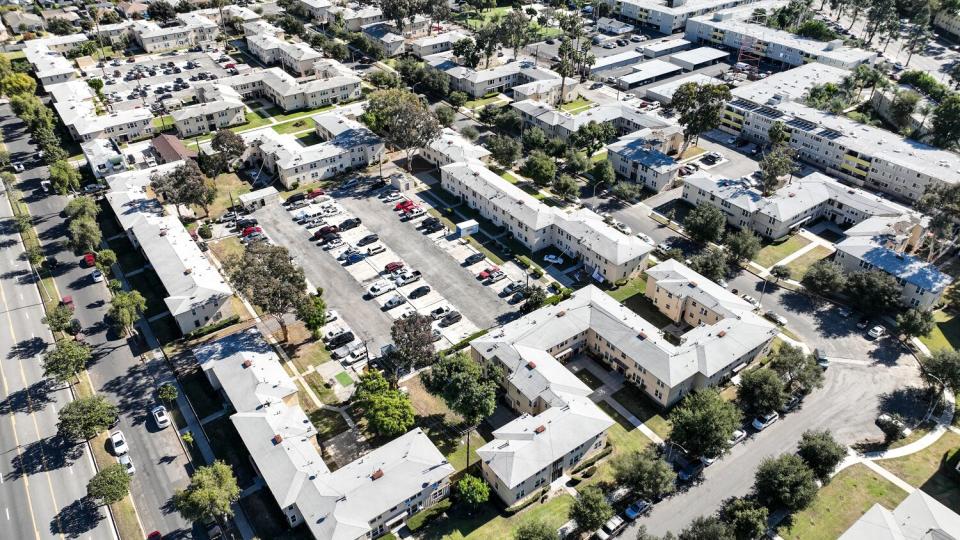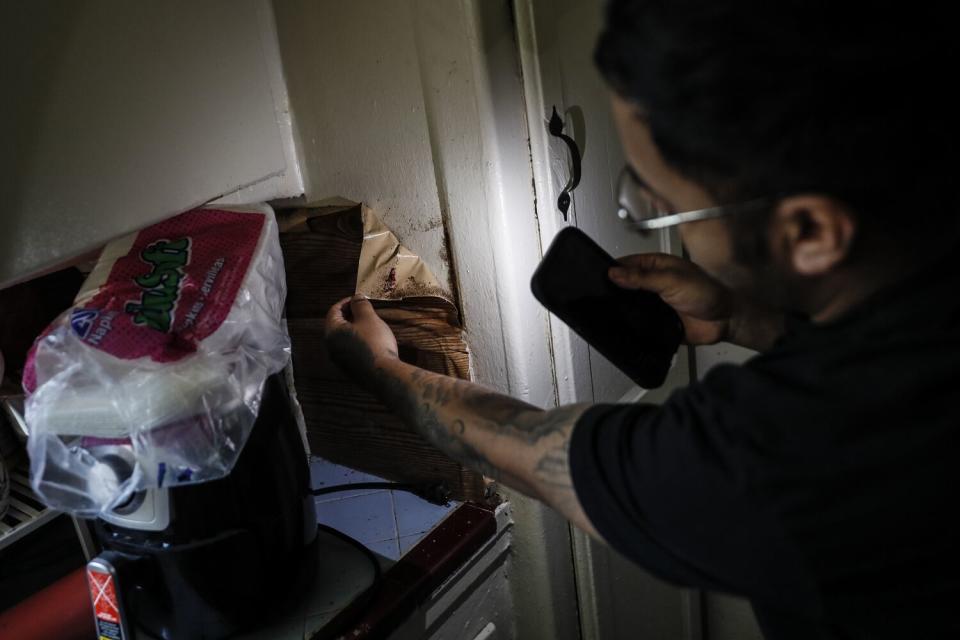Poor housing conditions continue at L.A. apartment complex, despite 2,000 citations

Maintenance workers installed new vinyl in Ruth Perez's one bedroom apartment over floorboards that sag under foot. They put a new drain pipe in a sink that still clogs. They screwed new cabinet hinges into rotted wood. And they haven't yet bothered to replace the stained carpet, or the heavy wooden closet doors that keep coming off their tracks.
“It’s just back-to-back issues,” said Perez’s 23-year-old son, Yonathan, who lives with his mom and two younger siblings. “They fix one problem and then another one comes up. We don’t feel comfortable in our own home.”
It’s been more than six months since L.A. city and county officials pledged rapid action following a Times story that revealed rampant slum-like conditions at Chesapeake Apartments, a World War II-era, 425-unit complex that stretches multiple blocks in South Los Angeles. Since then, code enforcement and public health inspectors have issued more than 2,000 citations to the landlord, Pama Properties, for violations including plumbing and electrical failures and cockroach and mold infestations.
Now the bulk of the inspection efforts appear to be concluding, even though residents point to continued problems. Tenants and activists describe mounting resentment and resignation as yet another attempt at making Chesapeake Apartments safe and habitable remains unresolved.
“It frustrates the tenants to go in circles about this,” said Sergio Vargas, co-director of the Los Angeles chapter of the Alliance of Californians for Community Empowerment, which has been organizing residents at the property since the spring. “We think there should be a complete change of the system. Clearly, this is not working for the tenants at all.”
Over the past five years, county public health inspectors had found an average of more than three violations per month at Chesapeake Apartments, the most of any residential property in L.A. County during that time, a Times analysis found earlier this year. Companies linked to Pama Properties President Mike Nijjar own more than $1 billion in real estate, predominantly in Southern California, and many other properties also have had serious health and livability problems, according to a 2020 investigation by LAist.
Prior efforts at oversight have foundered. In 2017, L.A. City Attorney Mike Feuer sued Pama Properties and Nijjar over crime problems at Chesapeake Apartments, resulting in a settlement that required upgrading the complex’s security systems. In late 2021, city code inspectors began an assessment of the entire complex, one required by law every two years, and gave it a clean bill of health.
Yet nearly two dozen new complaints came in during and after the review. City Chief Inspector Robert Galardi told The Times that assessment had failed, blaming challenges caused by the COVID-19 pandemic. Galardi ordered a new complex-wide assessment, one that would include the county public health department, that began in June.

A flurry of activity followed. The volume of citations led the landlord to make fixes throughout the complex and inspectors returned multiple times to check on their progress. After one review found numerous instances of peeling paint, the county set up a mobile clinic to test residents for lead poisoning.
These efforts culminated in a public hearing last month to determine if Chesapeake Apartments would enter a program for problem landlords. Tenants whose apartments are in the program receive rent reductions and can pay their monthly rent to the city, which holds the money in escrow as an inducement for the landlord to make repairs. In preparation for the hearing, code enforcement officials said that tenants throughout the complex could be entitled to rent reductions of 10% to 50% because of the violations.
But at the start of the meeting, city inspectors said that the nearly 1,600 code violations originally identified had been reduced to 84 because of the repairs made. Representatives of Pama Properties requested an additional month to make more improvements.
“I’ve seen many of these cases,” said Thomas Nitti, a lawyer representing the landlord said at the hearing. “This case was almost wrapped up in an extraordinary amount of time.”
The hearing officer determined that Pama Properties was making good-faith efforts to comply and gave it more time. Last week, city code enforcement and county public health cleared all the remaining violations from the initial review from June.
Jim Yukevich, another attorney for the landlord, said in a statement to The Times that the health, safety and welfare of tenants are the “highest priority” for property managers. The company, he said, has worked diligently to correct any issue raised by the city housing department and will continue to do so.
“We will respond as quickly as possible to any that are brought to our attention,” Yukevich said.
But for many residents, last month’s hearing was just another example of the difficulties in ensuring long-lasting repairs are made.
More than two dozen tenants attended to complain about continued poor conditions in their units, and expressed frustration at the city's convoluted process for holding the landlord accountable.
The hearing lasted for six hours on a Tuesday morning and afternoon, with the entire first hour dedicated to the hearing officer swearing in everyone who wanted to speak. Tenants said they were unaware what violations had been identified in their apartments and expressed shock when told that, according to the city, they had been resolved.
Angel Bivins said at the hearing that the water in her apartment is shut off regularly, maintenance workers failed to replace the blinds and screens on her windows and her smoke detector wasn't working, among other issues.
"Would you live here or would you have your loved ones live here?" Bivins said. "If a repair was done in that way, would that be an adequate repair in your house? If the answer is no, then guess what, it shouldn't be an adequate repair in mine either. This thing is 100% unfair."
Part of the concerns stem from the continued fragmentation among those responsible for oversight of the complex. Bivens and other tenants complained during the hearing about mold in their units, only to be told that the county public health department handles those problems. Recent notes from city code inspectors also show that when tenants said the landlord was harassing them, they were directed to call another department within the city that's in charge of those issues.

The challenge has only been made greater by upheaval at City Hall, said Vargas, the tenant organizer. Last fall, Councilmember Mark Ridley-Thomas was suspended from representing the district where Chesapeake Apartments is located after a federal indictment on bribery charges. The initial replacement for Ridley-Thomas, Herb Wesson, was forced out in July after serving for five months when a judge ruled that city term limits barred him from representing the district even on an interim basis.
Vargas said Wesson’s replacement, Councilmember Heather Hutt, initially came out strongly behind the Chesapeake Apartments tenants. When she met with residents soon after taking office, Vargas said, she told them she was going to take on their landlord.
“She said, ‘I’m ready to kick Mike Nijjar’s ass,’ ” Vargas said.
But since then, he said, Hutt’s office has not responded to tenants’ requests for additional meetings and has been little help with navigating the city bureaucracy.
“We’re seeing the councilmember hiding from meeting with tenants, the housing department not coming out and meeting with tenants,” Vargas said. “It feels like neglect on the part of the city of Los Angeles for this vulnerable, Black and brown community that’s being abused by a big corporate landlord.”
Ariana Drummond, a spokesperson for Hutt, said the councilmember was on vacation and unavailable to comment.
City and county officials contend they've made substantial efforts to safeguard the tenants at Chesapeake Apartments. Inspectors said their oversight is continuing, even though they’ve been hamstrung in part because they say many tenants aren’t allowing them into their homes. Last month, after obtaining warrants to enter apartments, city and county inspectors examined another 50 units and found another 650 combined violations that remain under review, according to both agencies.
“The inspection process at the Chesapeake Apartments is far from completion,” said a county public health spokesperson who declined to give their name in response to written questions from The Times. “Further inspections will be conducted, and if required repairs are not completed in a timely manner, public health will consider all options, in conjunction with [the city], to obtain compliance.”
Nevertheless, years of problems have left the Perez family cynical about improvements.
Ruth has lived in the complex for five years, and her family is in their second apartment after the landlord moved them from the first because it was overrun with mold, she said. Three years ago, a rotted kitchen cabinet door fell from its hinges and struck her in the head, and her son Yonathan had to call an ambulance for help. The cabinets have yet to be replaced. Only the hinges are new.

“They just come and put the same things back even if it’s all full of mold and messed up,” said Yonathan, who is a truck driver.
The family pays $1,017 a month in rent and Ruth recently left her job cutting and preparing fruit at a juice bar 20 miles away after her hours were reduced. She now sells appliances and other products she purchases wholesale online or at street fairs.
The Perezes say they would leave Chesapeake Apartments if they could. But they can't afford anywhere else.
This story originally appeared in Los Angeles Times.

